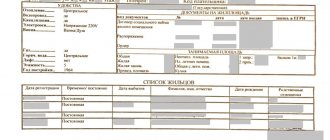Home / Eviction / Algorithm for discharging a minor child from a municipal apartment
Discharge of a minor citizen from municipal housing or private property is often accompanied by a number of difficulties. They appear due to the fact that the state directs laws to protect the interests of the child and tries in every possible way to protect its little residents from deceptive manipulations by adults.
In this article, we will tell you what steps should be taken by parents who decide to deregister their child from a municipal apartment, explain all the nuances of this procedure, and also provide detailed step-by-step instructions for deregistering a person under 18 years of age.
Legislation on deregistration of minors
The interests of children in any legal field are under special protection of the state. Like all other citizens of the country, they have the right to housing, but with certain features. According to Art. 20 of the Civil Code of the Russian Federation, young children must live with their parents, one of them or persons replacing them.
Registration of persons under the age of majority is carried out on the basis of an application from their legal representatives (grandparents, guardians). However, registration in this case is mandatory. If parents neglect this responsibility, they face an administrative fine.
Persons who have not reached the age of majority cannot independently change their place of residence or register. Consequently, only his legal representatives have the right to discharge a child from the apartment in the manner prescribed by law.
As a general rule, registration is carried out by registration authorities on certain grounds. One of them is changing your place of residence. Deregistration in this case is of a declarative nature. However, applications are accepted only from legally capable adults.
How to discharge a child from an apartment or other housing when it is sold
The need to leave the apartment is most often due to a change of place of residence.
In municipal housing, this may happen in connection with the exchange or termination of an old social tenancy agreement. Neither the adults nor the children in the rented accommodation are the owners. However, when discharged from it, care must be taken to ensure that the children's interests are respected.
Privatized housing is inherited, given or purchased.
When selling, all residents of the property being sold must be deregistered. Children are also discharged along with their parents. However, if the child is the owner of a share or the entire apartment, there are some nuances in the procedure.
If the child is not the owner
If parents and their children move out of their own apartment, they are deregistered. At the same time, it is important to register children at a new address in the near future. If the child does not have ownership rights to the housing being sold, then the parents simply need to submit an application to the registration authority and register the entire family.
If the child has property rights
If minors have property rights to housing, the deregistration procedure becomes more complicated. In this case, when moving, the consent of the guardianship authorities is required. They are called upon to ensure that the interests of children are respected, including in the housing sector.
Therefore, to alienate an apartment, one of the owners of which is registered as a minor (minor), it is necessary to obtain permission.
Authorities responsible for protecting the rights of minors must ensure that the child is provided with equivalent housing and that his rights are not infringed.
If the apartment is privatized
When moving from a privatized apartment, the rights of children to this object are important. If the child participated in the privatization process or became its owner later, then the above procedure will need to be followed.
Alienation of any residential premises whose owner is a child is possible with the consent of the child protection authorities. They will evaluate the legality of the transaction and compliance with the interests of the children. In addition, parents must provide confirmation of the availability of another place where the minor can be registered.
From a council apartment
Discharge of children from a municipal apartment is also required according to special rules . If adults can be discharged without specifying another place to live, then a child cannot be discharged anywhere.
In addition, new housing for children must comply with established living space standards. Each region has its own standards for the required living space per person. Deterioration of the living conditions of minors is not allowed.
The guardianship and trusteeship authorities are called upon to monitor compliance with all specified conditions. Therefore, before moving from non-privatized housing, you will need to obtain their consent.
Divorce of parents
Checking a child out of an apartment and registering him in a new home is a difficult task. The situation becomes more complicated if the parents decide to divorce. According to the law, such a situation should not affect the rights of a minor in relation to real estate and other areas (IC RF, Article 55). If, after a divorce, parents plan to deregister their child and register them in another property, they must take into account a number of points:
- Is the child the owner of the property? This is important, because the involvement of minors in the issue of privatization is mandatory according to the requirements of Federal Law No. 1541.
- Whether the person under 18 years of age was registered in a social accommodation.
To deregister a child from privatized or municipal housing, you should adhere to the following rules:
- obtaining approval from the PLO;
- Immediately after the discharge is issued, the child is registered with the mother (father) or an official representative (this condition is mandatory if the person is under 14 years of age).
In practice, the parent with whom the child does not live is interested in deregistering a child during a divorce. But it is worth considering that the registration of a minor with his father is excluded if, by decision of a judicial authority, he must live with his mother.
How to register a child
After the child is discharged, it is necessary to register him at his new place of residence. When choosing a suitable place, it is important to focus on the registration address of the parents or legal representatives (guardians, trustees). If the minor has reached 14 years of age, this requirement is not met.
A new place of registration is important when enrolling a child in kindergarten, enrolling in school, applying for government benefits or treatment in a hospital. When registering a child in connection with the registration of the mother (father), official guardian or guardian, it means that the approval of the residents is not necessary, and the parent owns the housing. If possible, a specific share in relation to the child should be determined. If, in the event of a move, the size of the living space decreases, the PLO authorities refuse, and it will not be possible to sell the property. If approval is received, parents have the right to register the minor (depending on the circumstances) in a room, apartment or house. In the last two cases, registration is allowed only in part of the premises.
The property is not privatized
If the apartment is not privatized, it may belong to the state or local authorities. This indicates that the parents and child live in the apartment under a social tenancy agreement. They do not have the right to sell or carry out other transactions with housing.
To register a child in such an apartment, you do not need to obtain the approval of others registered. The registration process is free. Children under 14 years of age are registered only in relation to the place of residence of their parents or other relatives.
Documentation
To remove the baby from the apartment, the approval of the OPP will be required. The paper is issued after studying the situation and documentation. In particular, a certificate from the house register, identity cards, personal account (copies), documents for the child and an application are submitted to the authorized body.
After submitting the specified papers, you must wait two weeks and, after receiving permission from the PLO, go to the FMS. You must have with you:
- application for deregistration;
- permission issued by the PLO;
- passport of the parent (one or both) and documents for the child;
- title papers for housing;
- approval of the second parent (must be notarized);
- court decision (if any);
- disposal sheet with the information entered into it.
If a child is being discharged from a property that has not undergone the registration procedure, there is no need to visit the PLO and ask for their approval. The main thing is that the new living conditions do not deteriorate compared to the previous property.
Next, an application is drawn up on behalf of the child and submitted to the FMS. The application is accompanied by a registration certificate for the new housing, a passport, permission from a parent or judicial authority, and a disposal sheet. Up to 72 hours are allocated for the registration process. After this, the child is registered at a new place of residence.
To register in new housing, parents (one or both) fill out an application to the Federal Migration Service and attach a package of papers. The latter includes an identity card, the approval of the OOP, title papers for housing, and the approval of the second parent (judicial decision). An arrival sheet is also issued here. During the process of moving a child, the state strictly monitors that his rights are not infringed in any way.
How to discharge and register a child in another apartment
The procedure for deregistering children depends on the status of the housing being abandoned and the rights of minors to it. Regardless of whether the consent of the guardianship authorities is necessary, it is important to respect the interests of the child.
Registration authorities ensure that children are not discharged into the unknown. Therefore, after canceling your current registration, you must register at a new address. If an adult is discharged on his own, no such requirements are imposed on him.
Nuances of discharge after divorce
Upon divorce, persons with children have to decide on their maintenance and residence. The Family Code of the Russian Federation (hereinafter referred to as the Code) regulates the problem of living of children when, after a divorce, they have different places of residence.
Article 65 of the code provides that in these cases the parents must agree on the child's place of residence by mutual consent. For example, they can determine that the child lives with his mother permanently. The other parent can visit him at the agreed time.
If agreement on this issue cannot be reached, then it is resolved in court. Based on the results of the consideration of the case, the court, taking into account the interests of the child, determines his place of residence. Moreover, when changing it, the consent of the ex-husband (wife) for discharge is required .
How to leave your father's apartment for your mother's
In the event of divorce or other separation of parents, children usually remain with one of them. If there is a need to change the child’s place of residence due to an agreement or court decision, his or her discharge is required.
If, for example, the court decides that a minor will live in his father’s apartment, he must submit an application for an extract from the mother and consent for registration from the father. If one of the parties prevents the implementation of these actions, they can be carried out forcibly through the court.
Nuances of the discharge of persons not living in the apartment
By law, registration information must correspond to the actual state of affairs. However, in practice, often the residents registered in the apartment do not actually live in it. At the same time, the remaining residents or the owner of the property have to pay for housing and communal services and for them too.
Therefore, the issue of removing residents who have actually moved out from their homes is relevant. If the child left with his parents, it will not be possible to discharge him or deregister him in the usual manner. If there is no application from them for discharge, this issue will have to be resolved through the court.
About the residential address of the child and parent
During consultations, I am always asked a similar question: “I don’t know where the child and his parents live now. What address should I include in the statement of claim then? And if I know, then indicate their actual address?”
The defendant's residential address is his registered address. This is the position of the Supreme Court, described in paragraph 63 of the Resolution of June 23, 2015 N25. Therefore, in the statement of claim, we indicate the address of residence of the child and parent as the address of the municipal apartment from which they need to be discharged. They are written in it. The plaintiff has no obligation to know their actual address.
As a result, all court summonses will be sent to them at the address of the municipal apartment - Art. 113 Code of Civil Procedure of the Russian Federation. If they do not receive them (they do not live there), the court will still consider them notified. Any citizen is required to receive important correspondence, and parents/guardians do this for children. Therefore, the law is observed here. If they do not appear in court, the claim will be considered without their participation - clause 4 of Art. 167 Code of Civil Procedure of the Russian Federation. This benefits the plaintiffs because the defendants will not be able to protect their interests.
When to go through the courts
The issue of deregistration of minors (minors) can also be carried out forcibly. The need to file a claim for eviction or deportation of children may arise in the following cases:
- if the family does not actually live in the apartment, but is not deregistered on its own initiative;
- if there is no agreement between the parents about the child’s place of residence after the divorce;
- if one of the parents objects or prevents your child from being deregistered;
- upon loss of rights to reside in the premises.
It should be noted that deprivation of parental rights of one or both parents does not entail the termination of the child’s rights to live in their apartment.
Legislative aspects and standard package of documents
The rights of the child are protected by the Housing and Civil Codes of the Russian Federation. The state structure - the guardianship and trusteeship authorities - protects his property rights. A real estate transaction will be considered void if it is not approved by the guardianship authorities. In any situation, the authorities are on the side of the minor.
Important! You cannot discharge a child “to nowhere.” He must be given a new place of residence. Moreover, the conditions in another place must be equal or better than in the previous one.
An application for deregistration of a minor is considered by the court. Relevant documents are attached to it.
- Completed application. Its form can be found on the resources of the Federal Migration Service. The required fields to fill out are: full name, registration address, passport information, new registration address.
- Identity document for the applicant (passport) and the minor (birth certificate for children under 14 years of age and passport if his age exceeds 14 years);
- Documents confirming ownership of real estate.
The list of documents may differ in different regions. Detailed information about it can be found on the official website of the Federal Migration Service.
If the applicant cannot independently apply to the Federal Migration Service, then he has the right to transfer his powers to an authorized person who will defend the interests of the interested party in the presence of a notarized power of attorney.
The processing time for the application is three working days. If the court grants the application, the applicant will receive a departure certificate. It is used to register at a new place of residence. You shouldn’t delay it: the law provides for fines for violating registration deadlines.
The procedure for discharging a child step by step
If the parents decide to move or the child’s place of residence changes for other reasons, then it is necessary to remove him from the register. To determine the procedure, it is important to determine the status of housing, as well as the existence of the child’s rights to a privatized apartment.
If permission from the guardianship authorities is not needed, then the parents (other representatives of the child) must:
- Write an application for discharge for yourself and your minor child. After 14 years of age, children can fill out the document form themselves.
- Prepare the necessary documents.
- Contact the passport office (another body that carries out registration and discharge) or the MFC. Children over fourteen years of age must be present during the procedure with their parents.
In case of discharge of a child owner or from municipal housing, an obligatory step will be to contact the guardianship authorities. Parents will have to first obtain permission before applying for discharge. And with this permission go to the registration authority.
What to do if a new apartment has not yet been purchased?
If the parents have not yet bought a new apartment, then it is worth holding off on checking out. If it has been done, the following recommendations will help:
- Register the child with relatives. In practice, they most often register in the apartments of grandparents;
- If the child is over 14 years old, then there is the possibility of temporary registration in dormitories.
However, the methods are not designed for continuous use. It is recommended to register your child as quickly as possible. The rule also applies to orphans: guardianship authorities are obliged not to hesitate and help children find a new apartment.
Documents for the guardianship authorities to release a child from the apartment
To discharge young (minor) children, the following documents are required:
- a completed application form for discharge according to the approved form;
- passports of all adults;
- birth certificates for children;
- permission from the guardianship authorities (if required);
- documents on rights to new housing;
- consent for discharge from the second parent (if they are divorced).
If a family does not move to their own home, then they must present consent from the owner to move in and other documents confirming the right to reside. If it is necessary to obtain consent from child protection authorities, then a corresponding application and documents for the apartment are submitted for consideration.
Terms and cost of registration
How long will it take to discharge and register a minor child at a different address?
Parallel registration of a child in a new apartment with an extract from the old one refers to standard procedures, the lines of which do not differ from regular registration and amount, in accordance with clause 20 of the Admin. FMS regulations, from 3 to 8 days from the date of acceptance of the set of papers from the applicant.
Despite the fact that they will perform two accounting actions at once, this government service is free .









